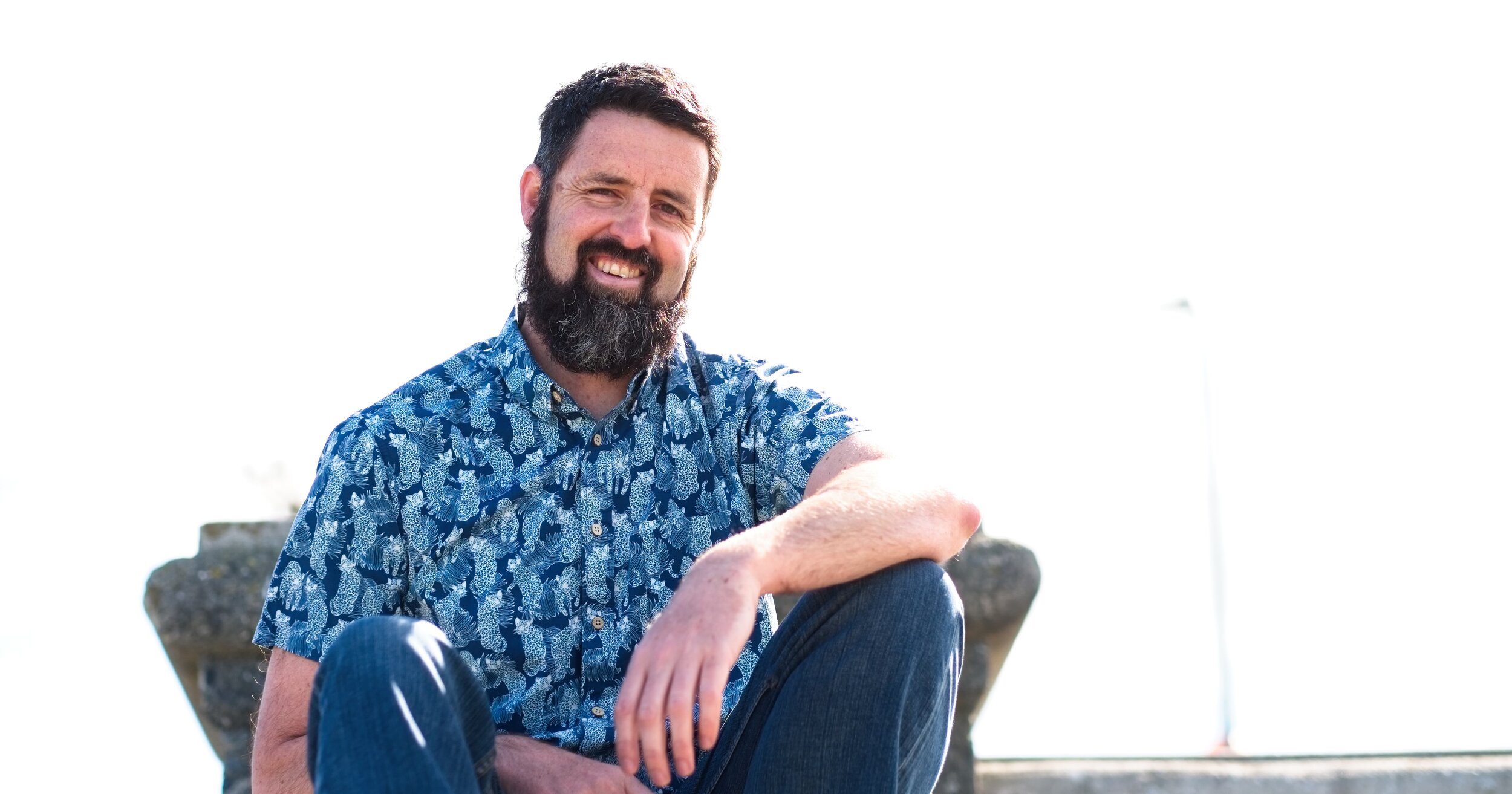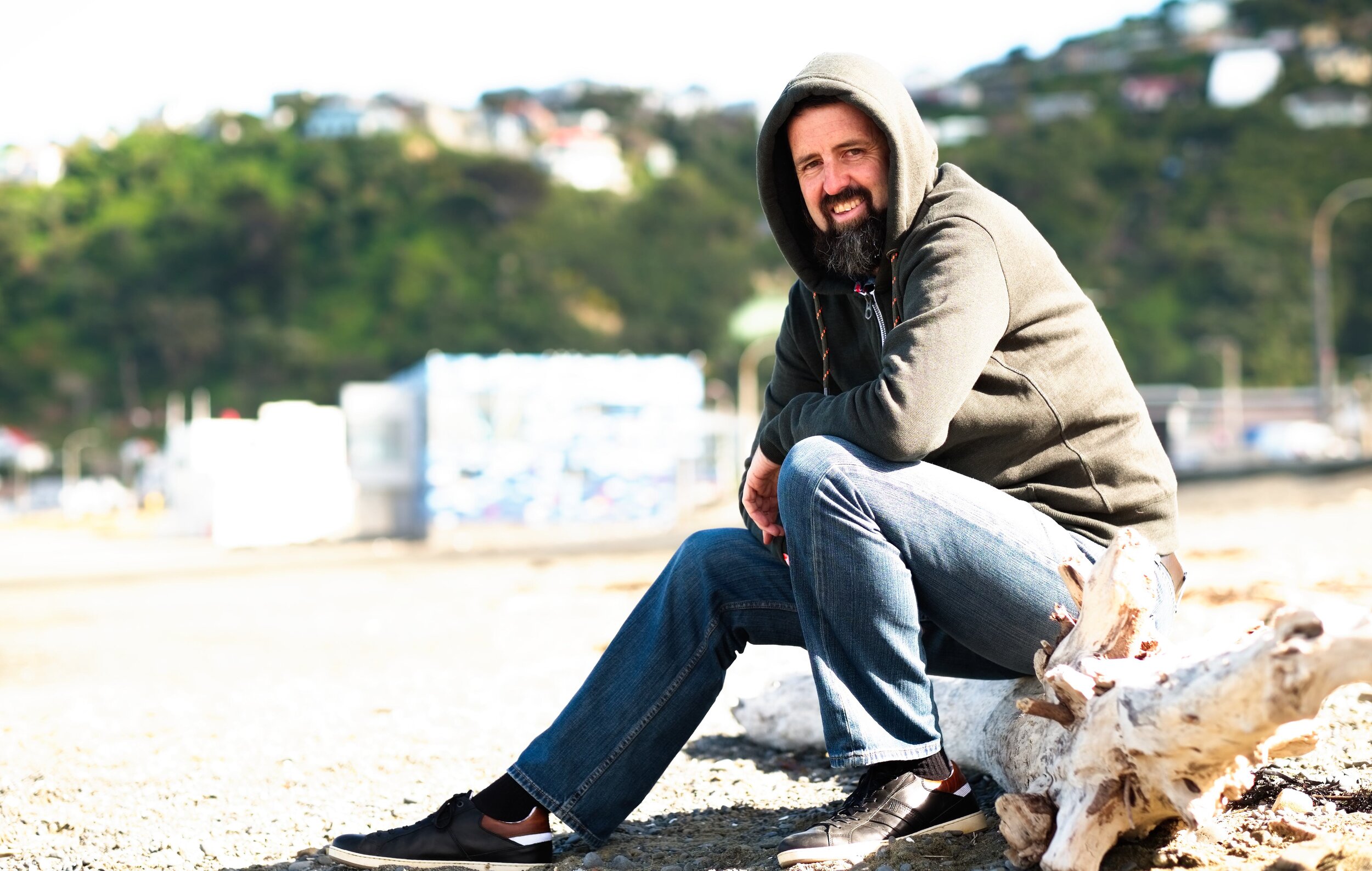Stevo will tell you that he’s no entrepreneur.
But Stevo’s the director of Ocular. A company that he started 14 years ago, now boasting a staff of 15, including Boris, Ocular’s Embassadog.
Their website says “We don't work for clients, we work with partners.”
Ocular is the guide, helping partners discover or refine their particular voice, story or brand. Effectively connecting those partners to their customers using video, web and print.
“We’re not smart, not fancy, not cool. We’re honest”
It all started when Stevo asked his flatmate Paul, “How do we make a video?”. Paul answered, “We need a camera and a computer.” So they bought them. This launched Ocular into filmmaking and their first project, a video about Wellington. It didn’t make them rich, but it ended up being great way to meet people from the city and hone their craft.
What was your vision when you first started your venture?
My vision was to make a video about Wellington and sell it. I trained as an engineer, so I’m very pragmatic. We were working out of a tiny room in our flat and needed enough money to pay the rent and survive. I was doing a lot of website work at that time. So I had other income.
The retailers we approached were surprised when we bought them the finished DVD. Apparently most people would never stick-it-out and deliver the finished product.
I had this nebulous thought that eventually the internet will be the way we get served all our media. I kept thinking “Man, we've got to really be across this.” I was aware that technology was changing so quickly. Our vision was that we’re on the wave, paddling in. Now we’ve got the choice, fall off the back or go on the face and have a crack at it. I think we're still doing that. But now the waves are bigger and the sets are a little bit shittier.
There's way more confusion now. People talking about ‘the next big thing’ without thinking about why or if it even should be.
At the start videos weren't really going on websites. Internet connections were slow. There was YouTube, but it was pretty painful watching anything and it was low resolution. I could see video and websites would end up in the same place. If your website, magazine and video are all made by different people, generally they won’t be talking to each other. Big agencies would have a brand manager. But the smaller places with tight budgets may not be as cohesive. So that was my vision. Cohesive channels.
The essence of brand is not just the ‘look and feel’. It's actually what do you stand for, your values and how you live them.
You can do that so much with a video. The style, whether it's a documentary or acted. You choose how it's coloured, how the shots are composed, the music. If it's an interview you choose the questions, how you build rapport or not, the way you ask the questions. It's really a struggle for someone who doesn't know a brand to come in and make a video for that brand.
We're not really disrupting that much. We do pivot like any other businesses do. If you stagnate and do things the same way, others will pass you by. You’ll miss the boat and not be offering better value.
How did you deal with early setbacks?
Oh God, constant setbacks, cashflow is the biggest one. It's probably the number one stress that pops its head up all the time.
We’ll do a big project, but then that means that we don’t get paid for a while. We do lots of small projects, people don't pay and then we’re short on cash. There have been periods when this has happened. There was once an enormous setback. We produced a TV show that had been pretty well received. We went to make a second season. We worked with a producer in another city who screwed us out of quite a lot of money and stole our ideas.
There’s always setbacks in business. Generally I would say I’m a pessimist who’s actually quite optimistic. Maybe the middle ground is being a realist. Don’t count your chickens. Don’t assume just because a piece of work has been promised that it will actually turn into a contract and the money will appear.
I’ve got a lot better and make sure that we don’t put all our eggs into one basket now. It’s why our services are varied and why we have a wide range of clients. Now we only work after being paid a deposit. If no deposit, then the payment terms are pretty close. We’re not going to wait two months before being paid. Work spanning over multiple months must have regular payments. Just to make sure we’re not wearing extra months of work. Maybe we could handle losing a month of work, but not two or three.
I generally try to solve the client’s problems for them. Sometimes that puts us, but that speaks to our values. We want to help them out. There was an expression a few years ago… ‘brand butlering’. It’s when we’re available, with the right solution, just when they need us. Some companies get that, think we’re fantastic and pay it forward with more work. Others take it for granted, don’t see that we wear the costs and that they never really had the right to demand that extra work in the first place.
“There’s a lot of emphasis at the moment on personal brand. I think personality is a better word. That’s what we always used to call it.”
Was there a time that you wanted to give up?
Yes… pretty much every day ;)
Look, I’ve got a young family. So I always have the desire to spend a lot more time with them, but I’m torn with focusing on my business. Starting a small business you're optimistic. You think, “Wow, this is going to be so great, I can really create my lifestyle”. Maybe some people achieve that. But when you’re very hands-on in a small business, the phone's never off. Even when you're not at work.
With websites in particular, any hour, day or night, something can go wrong. It's completely out of your control, hacks or internet outages. Generally hacks can be prevented by increasing security. But there’s not much you can do if a bulldozer digs up a power cable outside the server centre.
Advancing technology helps with more ways to keep websites online. If a hosting server has problems, the website will just keep running from another server centre.
Are there times when I want to exit? Yes, definitely. The cool thing about Ocular now is that I probably could exit. I've got a really cool management team. We’ve recently looked at Ocular’s structure, position, vision and values. We’ve got people in place who are congruous with what Ocular’s trying to achieve. If I did walk away, they would only have a week or two of pain, before they work it all out.
Were there any traps that you fell into?
Optimism is one of the big ones. Lots of people have ideas. Not that many people can execute their ideas or deliver them to a customer base willing to pay.
There's been two businesses that we've built technology for in exchange for a share. One is still operating. The other one wasn’t launched unfortunately. We weren’t involved with the marketing. I would probably be a bit more controlling of that now. Marketing is such a large discipline these days. I wouldn’t do it internally, because we wouldn’t be doing the project justice. We have digital marketing partners who we’d use instead.
Other traps? A lot of it comes to cashflow. For a long time I didn’t have any debt. That was a real struggle. We were paying for things from the next project being delivered. Having some more financial knowledge or an accountant with a focus on business development would have helped. We would have to win new work to pay for new equipment. Sometimes you can’t wait for the new project. You actually need the equipment in order to win the project. This involves getting loans or overdrafts. We’ve realised that we don’t necessarily need to own. Sometimes we can hire, depending on what we need to achieve.
When we moved into this space it was a really big commitment. I'm guaranteeing the rent for three years for a really expensive, but beautiful office on the beach. We've got more than enough space and really good heating. The previous office wasn't comfortable. It was ridiculous. We actually bought blankets for the team. So this office has cooling in the summer and heating for the winter. That's a huge thing, because if our people are unhappy then that's what they focus on, not their work.
The people in your business are really important. You need people who don’t just get their work done, but also think about other things. For example, one of the guys has been pushing me really hard on this new technology. I don't understand it, but it's a new infrastructure system for how the internet will work. It's the bare minimum that we should be offering to clients. He'll drive and make sure we can do that in the next year.
“Lots of people have ideas. Not that many people can execute or deliver them to a customer base willing to pay.”
“The Wellington Hustle Interview Project has been brought to you by timson.co.
Headshots and Story Brand Photos. Show off your vibe and attract your tribe.”
What inspires and motivates you?
It's a very hard question because it does change. Our business values are Accountability, Communications, Trust and Fun. We have some posters up in the office that summarises our values relatively well.
‘Don't be a dick.’ - That talks to Trust, Accountability and Communications.
‘Make epic stuff.’ - Which is about aspiration. We shouldn’t be just making stuff, it should be epic.
‘Get shit done.’ - Really important and the most business orientated. Being able to start and finish projects is pretty valuable.
Can you describe a breakthrough that you're particularly proud of?
The first TV series that I made was a professional wrestling show. It was thirteen episodes, made for very little money. We had a really good crew of people, who pulled together to get it done. We pushed the TV network to get us the show, we pushed for sponsorship. Brute force really. We filmed it all over three days. We converted a warehouse in Newtown into a wrestling arena. We shipped the crowd in and filmed the wrestling matches. Anyone could get to in watch. Even the warehouse landlord was in the front row. Forever enshrined holding up a ‘Kill ‘im’ sign. We made up all the signs for the crowd.
Technology's moved on so much now. We had to shoot these wrestling matches, but they had to be under 60 Minutes of tape. We had four cameras all running tape. We had piles of tape. Now it's all digital, hard drives, you can film for hours.
I think the achievement of actually delivering 13 episodes was a big push for a small team. We had one editor, myself, four cameramen and a sound engineer at home slapping his chest for sound effects. Really seat-of-the-pants - but we got it made and it looked good.
We rebranded and made some video for a client about a year ago. I wasn’t involved, I was just really proud of the outcome. Made me realise that I don’t have to do everything. That has actually worked out to be more successful. In terms of the art form, other people are way better and that’s why we hire them.
Has your vision always been clear and how has it evolved?
It's evolving all the time. You try something new and you go with it. The big thing for me is the concept of the art of mastery. You know you’ll never achieve perfection, even if you practice millions of times. There’s a science around practising a task 6000 times vs 9000 times. But actually there's always a way to do it slightly better each time.
Our vision is that we're striving to do things better by doing things differently. It's whether we don't do a particular piece of work anymore. For example, digital advertising, we decided that actually other people are better at it than us. So let's not try and fill that hole. It’s a constant evolution.
We're clearer about what we're trying to do, but this will also change. We are slightly market-driven. Our vision is to provide fantastic video to lots of people. But actually lots of people don’t want us to provide video to them anymore. Lots of people can now make their own. They can really beautiful and good value.
If we have a client who would be better suited to a product that's not ours, then we often help them to do this and save them money.
“Make epic stuff. We shouldn’t be just making stuff, it should be epic.”
What is brand to you and its importance?
Brand is not marketing. Brand is not a logo or colour-set you’ve chosen for your company. It's understanding what your business does. Being honest and reflecting that to your outward facing audience.
A brand exercise involves talking to stakeholders, understanding your vision, understanding where you're coming from. Not just where you want to be, but who you are and what you like. There's a lot of emphasis at the moment on personal brand. I don't really adhere to it. I think personality would be a better word. That’s what we always used to call it.
I think the part of sharing who you are is not truthful anymore. I suspect people are sharing more what they want to be rather than who they actually are. I really worry, we’re sharing this remarkably high standard about what our life is like. In the old days, maybe we shared the shit a bit more.
What have you implemented for your brand? What was the impact?
The brand of Ocular is that we tell it how it is. But you've got to walk that value and don’t just say ‘this is who we are’.
Don't be a dick also applies to our clients. We don't want to work with dicks. There's no value for the client if we're not loving them. Having love for the stuff that you do is really important. If you're not enjoying your job, you should leave your job or find a way to enjoy it. That's the aim really for Ocular.
We've got a beautiful logo, colours and website. How our brand is perceived is probably a little bit irreverent, maybe a little bit loose. We're not. It looks like it, but we're not. We do things pukka (solidly). That's where our brand sits.
How are you helping your clients with their brand?
For our clients we help their brand by pointing out to them that it's not just about a logo. That actually a brand is the way they live their life. It is the personality, ethics and approach of their business. Then we create a strategy that helps our clients curate and market that.
We still get clients asking for a logo and that's cool. But we try and get them to understand. Even if they don't get their brand, we still work to understand it so we deliver something that makes sense.
Do you have any tips for others striving to improve their brand?
Be really honest with yourself. Even if you can't be honest with other people. Start with being really honest with yourself about your reasoning, what you stand for and who your business is. It doesn't have to be this big angsty exercise. You could be a builder who just wants to build really good houses to make sure people will be warm and dry. It’s okay to say you also want some money. That's unfortunately the world we’re trapped in at the moment. But if your branding exercise results in “I want to make lots of money cutting corners to compromise on the build”, that's a different brand.
Connect with Stevo
If you have enjoyed this article and want to start a conversation with Stevo, you can reach out by:
Website: ocular.nz
LinkedIn: linkedin.com/in/stevoorourke
Please don’t forget to tell Stevo that I sent you.
Interview and photography by Wellington Headshot Photographer, Tim Morrison (all rights reserved)











